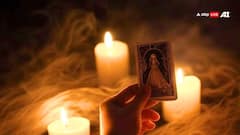Stories From Mahabharat — Why Krishna Did Not Fight The Kurukshetra War
Lord Krishna chose to take part in the Mahabharat war only as Arjun's charioteer & guide. He could have ended the war in a moment, but he let the outcome be as per the choices of individuals.

The Mahabharat, one of the greatest epics in Hinduism, describes human nature and talks about duty, morality, and the complexities of man. The epic describes the role of Lord Krishna, an avatar or incarnation of Lord Vishnu, in detail. Krishna plays a central role in the entire Mahabharat and the Kurukshetra war in particular.
Krishna was believed to have immense power and divine status, but he chose not to fight in the great Kurukshetra war. Instead, he only served as a charioteer and guide to Arjuna, one of the Pandav princes. As the narrative goes, Krishna, the Virat Purush as he was called, could have ended the war even before it began; or could have defeated the Kauravs in a blink. But he chose to let the events unfold as per the choices of the individuals. This is why the Mahabharat, especially the verses of the Bhagavad Gita, is considered to be a philosophical text as well.
Krishna — The 'Supreme God'
Krishna's status as the Supreme God is emphasised several times in the Bhagavad Gita. In chapter 9 verse 11, he talks about the ignorance of humans. He says: "Avajananti mam muḍh manushim tanumasritam, param bhaavam ajananto mama bhutamaheshvaram," which essentially means: "When I am In my personal [human] form, fools are ignorant of my divinity as the Supreme Lord of all beings."
In verse 18 of the same chapter of the Bhagavad Gita, Krishna says that he is the one who sustains all living beings and is their master, shelter, and friend. "I am the origin and end of all creations," he says. He goes on to say that he is the spirit of all beings and is the tangible matter on earth.
There are many such shlokas in the Mahabharat that cement Krishna's position as the Supreme being or Supreme God in Hinduism. Despite his status and abilities, he refused to take part in the Kurukshetra war.
Citing this, many often ask: "Why did Krishna not participate in the Mahabharat war?"
Krishna Upholds Dharma
Krishna’s primary purpose in the Mahabharat was to uphold Dharma or righteousness. The war itself was a result of adharma —the unrighteous actions of the Kauravs, particularly Duryodhan, who repeatedly wronged the Pandavs. By not participating directly in the battle, Krishna, who is considered the Supreme God, maintained a position that allowed him to guide the Pandavs without being perceived as biased.
His role was to ensure that Dharma prevailed, and that could only be achieved if the Pandavs won the war through their own efforts and righteousness, rather than through divine intervention. Krishna wanted the war to be remembered for the victory of Dharma over adharma.
Krishna Preserves Free Will
Krishna, known as Dwarkadhish (king of Dwarka), was also a ruler who believed in the free will of individuals. Every character in the Mahabharat had to make his or her own choice, and each of these choices determined the outcome of the war. If Krishna had fought in the war, his divine power could have easily tipped the scales, rendering the efforts and decisions of the human warriors meaningless. By not fighting, Krishna ensured that the warriors’ actions and decisions were their own, preserving the integrity of their free will and the moral lessons that would follow.
Krishna Was A Guide
Krishna played the role of a mentor-guide and not a warrior in the Mahabharat. His most significant contribution was the Bhagavad Geeta, the sacred dialogue between him and Arjun on the battlefield. The Bhagavad Geeta is a spiritual and philosophical guide that addresses the moral dilemmas faced by Arjun, offering insights into duty, life, death, and the nature of the soul. By choosing to guide rather than fight, Krishna fulfilled his role as a teacher, imparting wisdom that holds relevance even in today's world.
Krishna's Choice For Duryodhan And Arjun
Before the war, both Arjun and Duryodhan sought Dwarkadhish Krishna’s help. As Dwarka's king, Krishna commanded the fierce 10 lakh-strong Narayani Sena, due to which no kingdom dared to attack Dwarka. Krishna gave Arjun and Duryodhan a choice: One could have his entire army, while the other could have Krishna himself, but unarmed. Duryodhan, driven by his ego, chose Krishna’s army, thinking that strength in numbers would secure his victory. Arjun, on the other hand, chose Krishna, valuing his wisdom and guidance over military might.
Krishna’s decision not to fight was also a fulfilment of this promise, as he had assured Duryodhan that he would not wield a weapon in the battle. Also, it was the princes' choices that determined the outcome of the war.
Krishna Symbolised Detachment
Krishna’s detachment from the act of fighting symbolises the spiritual ideal of non-attachment to the fruits of action, a core teaching of the Bhagavad Gita. In chapter 2 verse 47 of the Bhagavad Geeta, Krishna says: "Karmanye vadhikaraste ma phaleshu kadachana, makarmaphalaheturbhurma te sangostvakarmani," meaning one must perform one's duties without worrying about the fruits of their actions.
Krishna advises Arjun to perform his duty without attachment to the outcome. By not fighting, Krishna embodies this principle, showing that one can be involved in the world and its duties without being entangled in the results. His non-participation in the actual combat was an example of this spiritual wisdom.
Krishna Ensured Moral Victory For Pandavs
Had Krishna fought in the Kurukshetra war, the victory of the Pandavs would have been attributed to divine intervention rather than their morals and efforts. By not wielding a weapon, Krishna ensured that the victory of the Pandavs was seen as a result of their righteousness, strategy, and courage. This not only upheld the moral order but also cemented the idea that victory through righteous means is more honourable than one achieved through divine force.
It can also be seen as an embodiment of the proverb: "God helps those who help themselves," variations of which can be found in ancient Greek works of Sophocles and Euripedes.
Related Video
Astrology Forecast 2026: Astrology Forecast Flags Health, Power Challenges for Trump in 2026s


































